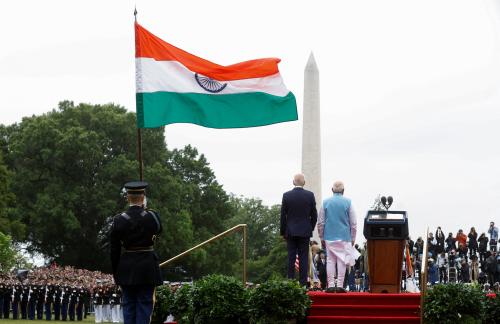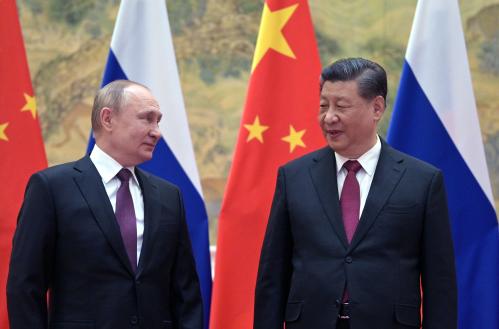INTRODUCTION
As the emerging global order takes shape, debate is growing more intense around the trajectory of the rising powers and what their ascendency to positions of regional and international influence means for the United States, its traditional allies, and global governance more broadly. Commentary about these rising powers— often referred to in a generic way as the BRICS (Brazil, Russia, India, China, South Africa) but actually encompassing a dozen or so countries largely represented in the G-20—ranges from alarmist to sanguine. Pessimists argue that China, with its impressive economic growth and increasingly global reach, is well-positioned to challenge the United States’ role of global superpower and to weaken the commitment of other rising powers, and various international organizations, to liberal values. More optimistic analysts insist that the rise of middle powers, most of which are democracies of varying stripes, bodes well for the world: millions are being lifted out of poverty, rule of law is taking hold and the international system is bound to be a more inclusive, representative one.
Each of these narratives holds some truth. It is in principle a net positive and a success story of the post World War II system that these states are growing stronger and more integrated in the global architecture. As China impressively expands it economic reach, its model for growth— one that has embraces elements of capitalism and a growing middle class while retaining authoritarian powers and repressing dissent—has become increasingly attractive to other developing countries striving to improve their economic performance, and a counterpoint to the so-called Western model of democratic development.
It is misleading, however, to suggest that the rise of emerging powers is inevitably a threat to the predominant Western democratic success story. A group of these rising powers—namely India, Brazil, and South Africa, acting at times under the IBSA banner, along with Indonesia and Turkey, a group we collectively refer to as IBSATI—are making impressive economic strides, including expanding middle classes, while simultaneously consolidating their own democracies and expanding the rights of their citizens. All five are members of the G-20, the leading group of major economies, all of which also happen to be democracies, with the exception of China, Russia and Saudi Arabia. Leaders and activists around the globe are looking to these states as relatable models of economic and political success, opening new opportunities for influence. This is especially true in the context of the Arab Spring, where transitional states increasingly are looking to emerging democratic powers for assistance and advice. Turkey and Indonesia, as large Muslim-majority democracies, play a potentially crucial role in this regard. For those in the West, and elsewhere, concerned with the future trends of global attention to democracy and human rights, it is critical to understand how these new, rising powers incorporate democracy and human rights into their foreign policies.
Of course, while they all share a common identity and sense of pride at having emerged triumphant from the dark days of authoritarian, military, racist and/or colonial rule, each of these states has unique histories and associations with democracy and human rights and each will incorporate these values into its foreign policy differently. All five articulate a strong belief in the value of democracy and human rights as a principle of foreign policy and have signed on to a long list of treaties, charters, declarations and communiqués politically binding them to honor such values at home and abroad. Similar to established democracies, however, these rising powers behave inconsistently and unpredictably when it comes to applying these principles to concrete cases. Like any other country, they are primarily concerned with national security, economic growth and regional stability and carefully and cautiously weigh the costs and benefits of raising democracy and human rights issues bilaterally or multilaterally against these primordial interests.
As they seek to play a bigger role on the global stage, policymakers face a new set of challenges arising from their own domestic situations. Internal democratization coupled with globalization in trade, migration and communications is opening foreign policy decisions to wider attention and scrutiny and presenting governments with more difficult tradeoffs. Within the complexity of this decision-making environment, it is important to learn if and how democracy and human rights fit into these states’ conceptions of national interests as they ascend to positions of regional and international influence.
To better understand how these states have performed on international democracy and human rights challenges in the last five to ten years, we have undertaken an analysis of their approaches on such issues in their own regions as well as their reaction to the widespread demands for democracy and human rights in the Middle East. A review of how these states have performed regionally is a logical starting point for understanding what place democracy and human rights have in their foreign policy. After all, these states are considered— and consider themselves—leaders in their own regions. We then review their responses to the dramatic and unfolding events of the Arab Spring to provide further insight into how they incorporate values in their foreign policies in real time, and how they may address these issues in the future. We conclude with some core findings that help distinguish their individual and collective approaches from the other leading actors in this field, namely: their strong support for sovereignty and non-intervention in internal affairs, their preference for mediation and “constructive engagement” over condemnation and isolation, their deep antipathy to military intervention in the name of protecting or promoting democracy, their demand for greater equity in global governance and complementary resistance to initiatives led by established powers, and their willingness, in varying ways, to offer support to transitioning democracies, as demonstrated in the Arab Awakening. Within this group, the IBSA states act as straddlers between traditional powers in the West and their southern, non-interventionist colleagues, a stance akin to Indonesia’s, while Turkey is moving closer to a more robust stand for democratic change in its own neighborhood. For all five, there is a growing insistence on regional organizations as the frontline responders to political crises in their neighborhoods, a position that reinforces their own agenda for regional leadership.




